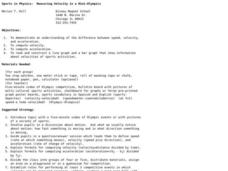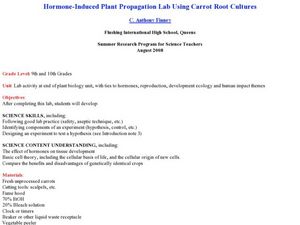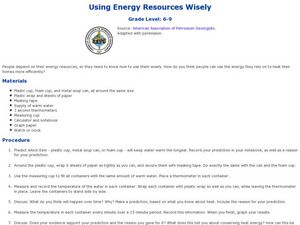Curated OER
More About Water Below the Ground
Students define groundwater. They identify groundwater's relationship to springs, artesian wells, ordinary wells and sinkholes. They describe the process by which sinkholes are formed. they define saltwater contamination and explain its...
Curated OER
Along Our Coast
Students explore the coast lines of Florida. They examine the benefits of estuaries and examine the estuary systems found along the coast. Students research and construct a saltwater food web.
Curated OER
Too Much...Or Not Enough?
Students discuss and define flooding. They identify areas in northeast Florida that may flood. Students examine droughts and explain the conditions that cause them. They examine the need for growth management in the state of Florida.
Curated OER
On the Other Hand
Students identify traits that are either genetic or developmental in nature and determine why it might be difficult to learn if handedness is genetic or developmental. They explore theories on the causes of left-handedness by reading and...
Curated OER
DNA Fingerprinting with Restriction Enzymes
Students will illustrate how restriction enzymes work by piecing together parts of a puzzle. Then they apply this knowledge to help them analyze genetic evidence from the scene of a crime as well as to help them comprehend how a DNA...
Curated OER
Ice Breakers: A Lab Experience About the Effects of Global Warming on Icecaps
Learners describe the physical properties of ice and speculates on the dangers that icecaps might pose on a global scale. They then demonstrate, through a series of experiments, several physical properties of ice (ability to fracture,...
Curated OER
Transverse Wave Demonstrator
Students discover the properties of waves in Chemistry and Physics. In groups, they develop and build their own device to demonstrate transverse waves. They complete their tests, record the results and discuss the conclusions with the...
Curated OER
Specific Heat Capacity of a Metal
Eleventh graders investigate the relationship between heat and energy transfer. They review terms including heat, work, calorimetry and the procedures for an experiment. After assembling the materials for the experiment, they observe...
Curated OER
The Plant and Animal Walk
Students draw pictures and write words to describe objects and experiences. They observe outside and draw at least three animals and three plants. Students observe plants and animals describing how they are alike and how they are...
Curated OER
USING the SCIENTIFIC METHOD for PROBLEM SOLVING
Students work in teams to map the scientific method as applied in a present day medical situation. Their collaboration of data and findings should lead to a mutual conclusion. Students watch a variety of video's concerning these situations.
Curated OER
Visit to the Local Weather Station
Students understand the preparation involved everyday to present the day's forecast and how the instruments are used to create an overall model for predicting weather. They will understanding of the terminology and symbols used in...
Curated OER
The Day The Earth Shook
Students explore structural engineering through three design challenges. They examine information about some architectural features that work and those that don't during an earthquake. Students build and test their structure and record...
Curated OER
Our Environment
Students engage in a literature study that helps students to connect with some of the issues of conservation. They list parts of the environment that need protection with the help of a graphic organizer. Then students discuss in groups...
Curated OER
Save the Planet!
Third graders explore the Recycle City Web site. They examine ways to save the environment. They write a short interview between a news reporter and an environmental expert. They practice acting out their news report.
Curated OER
Earthquakes and Seismic Waves
Students investigate the Richter scale and seismology in a teacher-led lab in which they are introduced to the concept of seismic waves and epicenter location. They further investigate the inner workings of a seismograph and practice...
Curated OER
Six Levels of Ecological Organization
Ninth graders describe the six levels of ecological organizations and give examples of each. They also differentiate between food chains and webs and identify trophic and consumer levels in food chain and food webs.
Curated OER
A Tasteless Tasty Test
Students review the inheritance patterns of simple dominant and recessive traits in humans. They use PTC tasting as a model trait. Each student determines whether or not they are a taster using PTC paper then they compile and discuss the...
Curated OER
Mechanical Energy
Students discover the difference between kinetic and potential energy in an experiment using toy cars and tracks. In small groups, they set up the experiment to determine the distance milk cartons will travel when hit by toy car. They...
Curated OER
Punnett Squares
Students revie the Law of Independent Assortment and Law of Dominance. They practice Punnet squares and predicting genetic outcomes and identify factors that influence heredity.
Curated OER
Battery Issues
In this batteries instructional activity, students read about the different types of batteries, including rechargeable batteries. Then students complete 3 short answer questions.
Curated OER
Worksheet 7/7 on Noun
In this nouns worksheet, students identify all the nouns in a one page text about the food chain. Students circle the 80 nouns in the passage.
Curated OER
Sports in Physics: Measuring Velocity in a Mini-Olympics
Eighth graders examine the difference between speed, velocity and acceleration. In this velocity lesson students read and construct a line graph and a bar graph to show information about velocities of sports activities.
Curated OER
Hormone-Induced Plant Propagation Lab using Carrot Root Cultures
Pupils evaluate the importance of hormones in living things. In this biology lesson, students experiment on carrots to differentiate how humans and plants reproduce. They collect data from experiment to answer analysis questions.
Curated OER
Using Energy Resources Wisely
Students discuss energy resources. In this energy lesson, students predict which item: the plastic cup, metal soup can, or foam cup, will keep water warm for the longest time by measuring the temperature in each item every minute for 15...

























